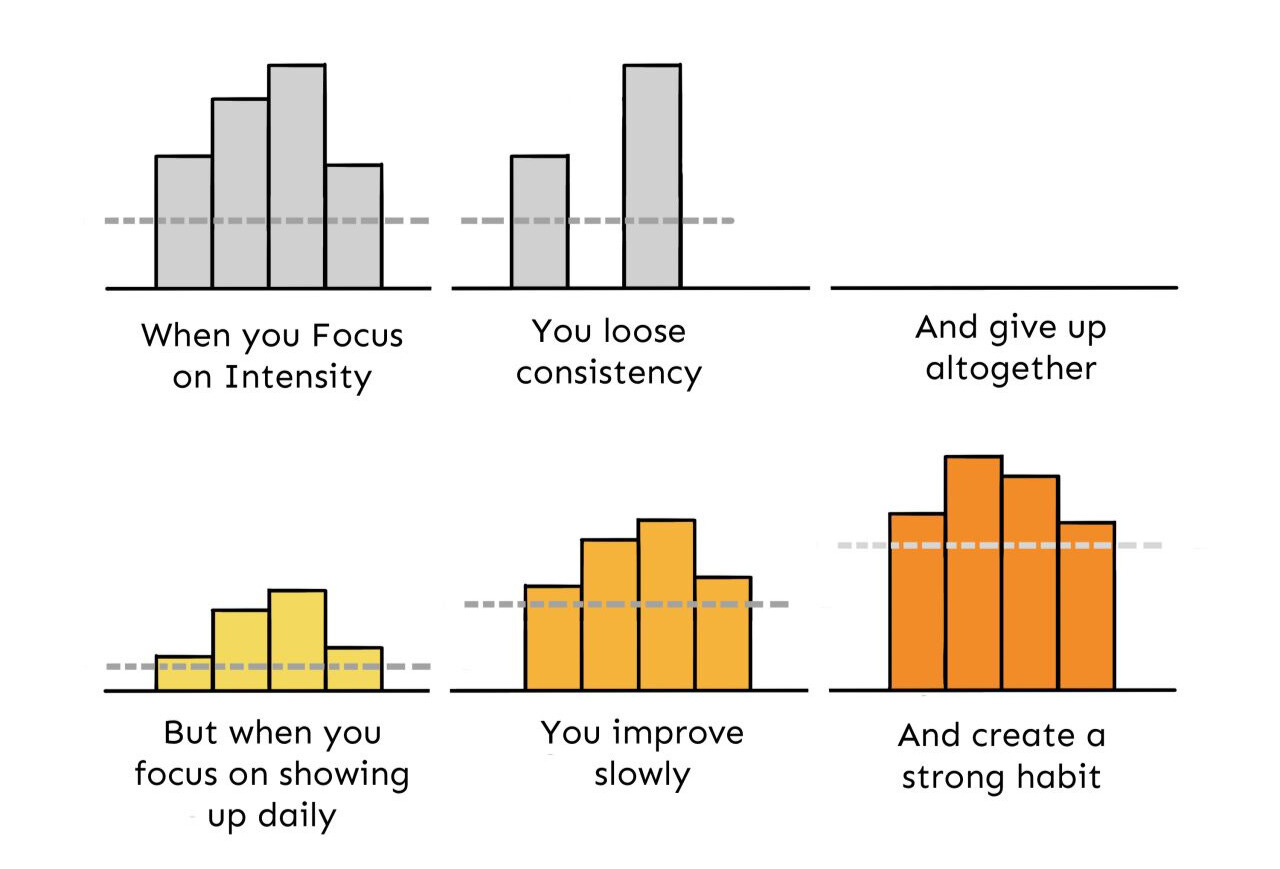
I’m not interested in anything that’s not sustainable. Friendships, investing, careers, podcasts, reading habits, exercise habits. If I can’t keep it going, I’m not interested in it.
Morgan Housel
Improving is challenging because it requires change.
Knowing what we want and figuring out what we need to do to get it is easy, but changing our behavior to do those things consistently is not.
Even though we want to make meaningful and lasting improvements to our lives, our instincts push us towards short-sighted impulsive behavior.
Instead of building incrementally towards our ideal vision of the future, we jump to immediate and sweeping changes. We start new diets, join new gyms, move across the country, quit our jobs, or make big purchases to kick-start our efforts, but they’re never effective because they’re not intentional or more importantly, sustainable.
Our instinctual attempts to make positive changes don’t work because we don’t have a reason behind them, the actions aren’t related to our desired outcome, and they’re focused on intensity instead of consistency.
To create meaningful and lasting change we need to resist our instincts and approach things with intention.
This starts with the reason why we want to make a change in the first place. Without a strong “why”, there is nothing that will push us forward when things get difficult. Setting a good role model for our kids is much stronger motivation for losing weight than trying to fit into an old pair of jeans.
When improvement gets difficult we’ll be more likely to continue our efforts if we have a strong reason that’s driving us to change.
Once we have a strong “why” driving us forward, we need to make sure the actions we’re taking will actually move us toward our desired outcome. Clever marketing and social media romanticize things that are correlated with positive change and improvement, but they’re often not causal.
Joining a new gym won’t get us in shape. Eating better and exercising consistently will. Moving to the woods won’t remove the stress and anxiety from our lives. Changing our work habits and lifestyle will. Buying expensive equipment for a new hobby won’t force us to make time for it. Adjusting our priorities and starting small will.
Once we know what improvement we’d like to make, why we want to make it, and what actions will actually move us forward in our pursuit, we need to resist the temptation to make big sweeping changes and focus on sustainable consistency instead.
Intensity is the enemy of lasting change.
The more intense our efforts are, the less sustainable they are. If we’re jogging we know the faster we run the less time we can sustain that pace and the slower we run the longer we can sustain that pace. The same logic applies to everything else we do in life.
Achieving meaningful and lasting change requires endurance, not speed. Big improvements and worthwhile pursuits cannot be achieved or mastered in a matter of days or weeks. In fact, they’re not things that can be accomplished at all.
These changes are not achieved with intensity, they grow through consistency over a long period. Meaningful improvements are simply sustainable changes and habits that we successfully integrate into our everyday lives.
One day is 0.27% only of the year. Our actions on any given day don’t matter, but the culmination of our actions does.
Meaningful improvement does not come from the big things we do every once and a while, it comes from the small things we do every day.
Prompts
What is one big improvement you’d like to make in your life over the next 1-3 years?
Why do you want to make that improvement?
What habit or change do you need to do consistently to make that improvement and how can you make that habit or change a sustainable part of your daily life?
Deep Dive
Sunsama - The World’s Best Daily Planner
Simple and elegant software to stay focused on key objectives and make daily progress while avoiding burnout.
Thanks for reading! I’ll see you next Sunday.
Kevin


